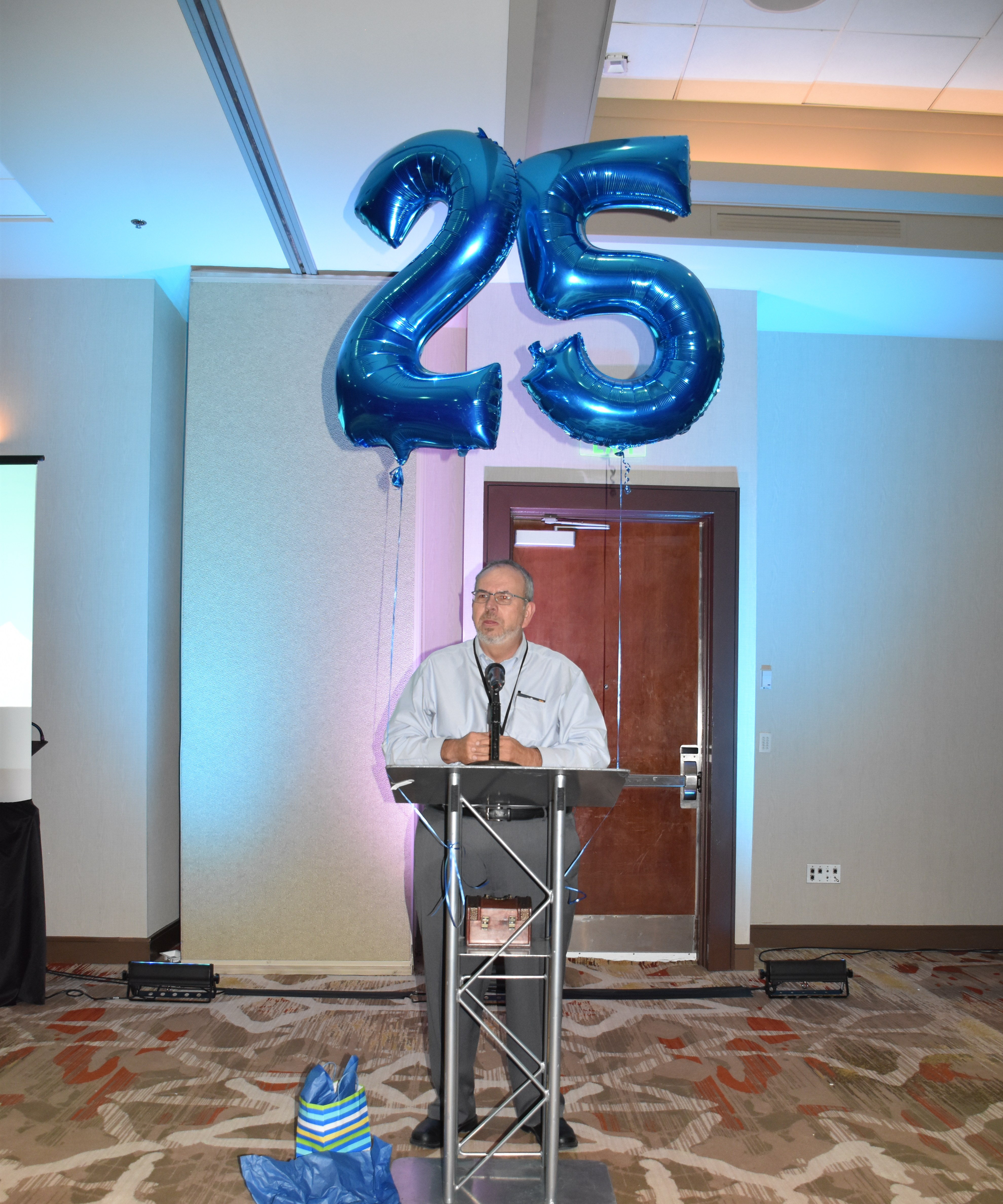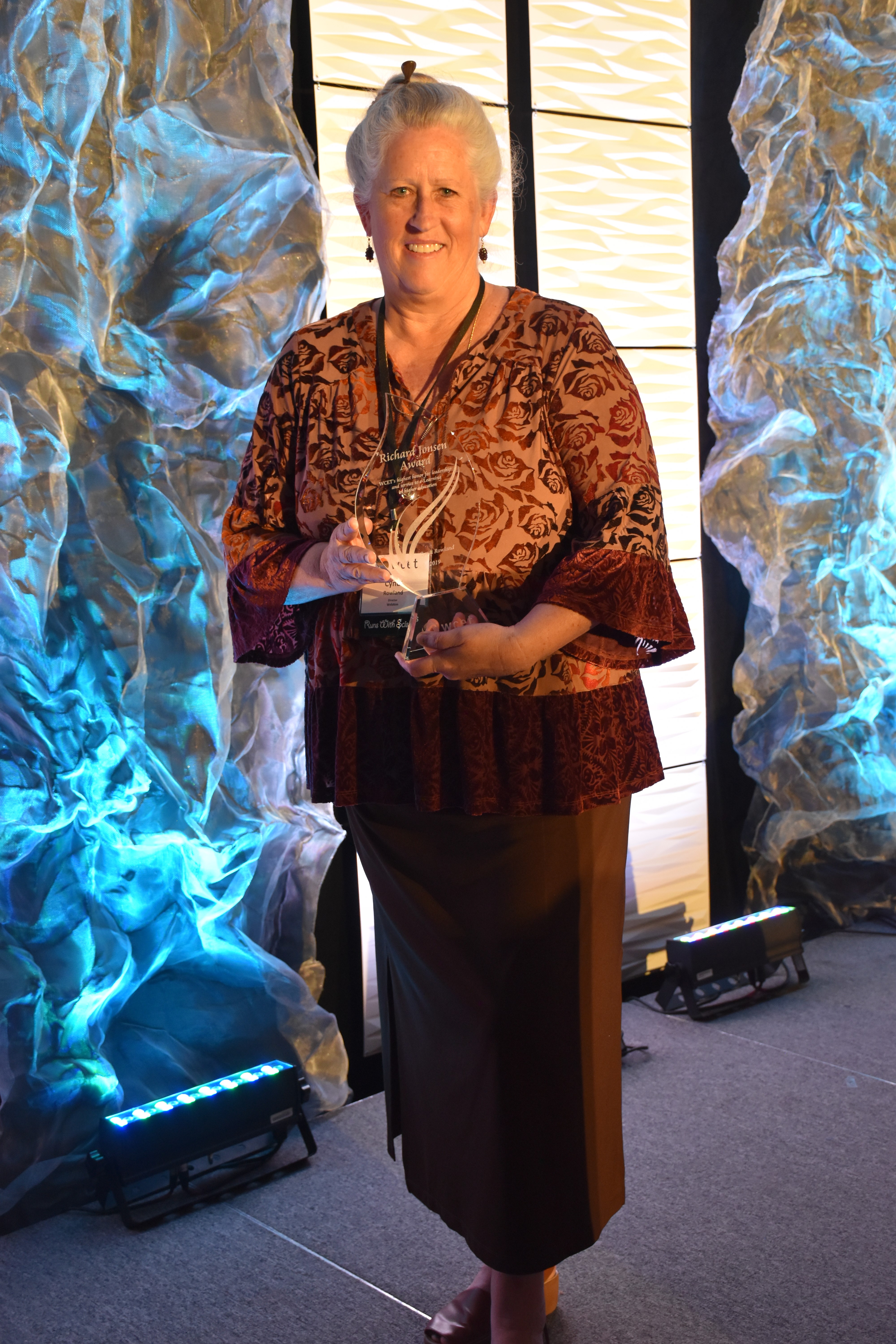Connecting with Community - WCET 2019
Published by: WCET | 12/6/2019
Tags: WCET, WCET Annual Conference, WCET Awards, WOW Award
Published by: WCET | 12/6/2019
Tags: WCET, WCET Annual Conference, WCET Awards, WOW Award
Welcome to the Annual Meeting Annual Summary Blog Post.! This year, I’ve focused it more on different topics of interest from the meeting, rather than going through a play-by-play of the week. I hope this year’s summary post is intriguing and fun, and either reminds you of a great week at #WCET19, provides you with good content if you missed #WCET19, but most of all, entices you to join us for one of our future events!

Thank you to the WCET team and leadership who provided notes and quotes for this year’s post.
Some of my favorite moments this year at WCET19 included the welcome reception, where we honored our new executive director, Russ Poulin, and celebrated his 25 years with WCET, and the closing “Stump the Higher Ed Expert” Session.
All of us at WCET enjoyed this year’s Annual Meeting so much! I was particularly thrilled to see how many first timers attended this year (43% of attendees!). It seems like you all agreed that it was a good year, as 94% of our after-conference survey respondents rated the quality of the program content as above average or excellent.
My week in Denver began with attending the WCET Steering Committee and Executive Council meetings. In case you haven’t heard much about these, let me share.
The WCET Executive Council is an advisory group for our Executive Director. They help by advising us on matters such as strategic direction and fiscal health.
The WCET Steering Committee makes recommendations on our activity themes for the year and leads or takes part in many of those activities.
These meetings help us, as WCET staff, connect with representatives of YOU, our members. We use these meetings to give updates on projects and clarify our focus for the coming year. We welcomed several new Steering Committee and Executive Council members this year.
This year we had TWO keynotes! That’s right!
Our opening keynote came from Michael Ellison, CEO and Co-founder of Codepath.org. Michael inspired us with his own personal story, which led him to the work he does today. Codepath.org is all about partnering with technology companies to bridge the gap between education and employment, especially for those typically underrepresented in the engineering community. Their goal is to eliminate educational inequity and provide curriculum and support to make college students more likely to be successful in computer science courses. The program has seen that 73% of students who take their courses get their first tech job and 81% of those students are still working in tech a year later. African-American alumni specifically have been four times as likely to land tech jobs, and 14 times more likely to work for a top tech company after their Codepath experience.
As he said, it is “unfortunate that so much of success is going above and beyond existing pathways.” It’s time we create pathways to success for all our students, instead of a select few.
Our second keynote of the annual meeting, held Wednesday morning, was from Diane Auer Jones, the Principal Deputy Under Secretary with the U.S. Department of Education. We were honored to have Diane join us at our event this year. Michael Goldstein (Cooley, LLP) interviewed Diane, who provided an update on many of the regulations that are now in place or will soon be released by the Department of Education. Diane said that one of the most under-reported changes is the expectation that credit hours reflect student effort, which may require more credits being assigned to lab courses. She also explained why it was necessary to change the reciprocity definition for state authorization so that states do not create rules that conflict with any reciprocity agreement that they enter.
Speaking of federal rules and regulations, here are several highlights from our “D.C. Updates” sessions:
Cheating cartels and academic integrity are currently a huge area of focus for WCET. Through this presentation by Western Governors University and the University of Maryland Global Campus, a 2018 webcast, and a forthcoming paper in 2020, WCET sees the seriousness of this growing industry sector that is targeted at institutions, at faculty intellectual property, and at vulnerable students. Presenters emphasized that this is a serious threat. What may start out as an offer for tutoring services, can easily turn into a site that shares assessments and posts faculty intellectual property. It is important to note that these “bad actors” are targeting not just online students, but all students. The panel discussed their use of “crawler bots,” provisions of the Digital Millennium Copyright Act (DMCA) for “take down” notices, and the importance to not criminalize the student but rather address the external threats. Look for a paper on this topic from WCET in early 2020.
I heard a lot of chatter about learning analytics and data at this year’s conference. There’s even a job title that is getting increasing visibility – “Data Wrangler.” Sessions focused on how to leverage such data for student support purposes. Many discussions were about meaningful collection of data, how to develop data literate staff, and how data collection systems could be put in place in order to better serve students. Questions remain about who is protecting student data. There are
This year we held several “unconference sessions” as part of the program. I was lucky enough to host the “young professionals in edtech” session and I really appreciated our conversation. The other unconference sessions centered on:
Have you been to an unconference before? They are loosely organized discussions around key topics led by facilitators. I really enjoyed this format and hope to see it used in the future. My colleague, Rosa Calabrese, attended the session on diversity, equity, and inclusion and said that they had great conversations around representing diversity through stock photos and being inclusive on job applications and even conference nametags.
This year’s award program (read “show”) was pretty unique! It was hosted by Tina Fey and Amy Poehler – no, wait… it was hosted by Tanya Spilovoy and me. Instead of a program we held the academy awards of WCET Awards shows! We enjoyed honoring several outstanding institutions and individuals this year, with a bit of fun thrown in.
This year’s WCET Outstanding Work or WOW Awards went to these institutions:
We have an entire series here on Frontiers about our WOW Winners. Check it out!
The Sally M. Johnstone award is named after WCET’s founding executive director. Sally led WCET from 1989 to 2006, creating the basis for the organization which is the leader in the practice, policy, and advocacy of technology-enhanced learning in higher education. From WCET, Sally has gone on to leadership positions at several institutions, continuing to be an advocate for student success and technology in higher education.

This award recognizes a professional who has made an outsized contribution for their ‘rank’ to the technology-enhanced learning community with the intention of recognizing thought leadership, excellence in practice, and demonstrated leadership capabilities. This award is meant to honor up and coming leaders in higher education.
The 2019 selectee of the Sally M. Johnstone Award was Crystal Faulkner, Instructional Technology Support Manager, Austin Peay State University. In nominating materials, Crystal’s colleagues told us that:
She has made an outsized contribution for her rank to the technology-enhanced learning community. She is a thought leader, demonstrates excellence in the field, and continues to strive to be a forerunner in the field of instructional technology. She inspires not only the Distance Education team, but any and all faculty, staff, and students that have the pleasure of working with her (Lady Moran, Director, Distance Education, Austin Peay State University).

The Richard Jonsen award is WCET’s top honor. This award is given annually to a WCET member whose career has been committed to improving postsecondary educational programs and services through innovative uses of technology as well as for exceptional service to WCET. The award is named in honor of Richard Jonsen, the WICHE Executive Director who nurtured the idea of a technology cooperative and founded WCET in 1989.
When presenting the award this year, Russ Poulin, our executive director, said:
If not for our winner’s tireless efforts and advocacy, the online opportunities for individuals with disabilities would not be where they are today. In the words of her co-workers, the “unsung hero of the digital accessibility era.”
Our winner this year was Cyndi Rowland, Executive Director of WebAIM. In 1999, she founded the Web Accessibility in Mind or WebAim. She has been its director for 20 years and has led it to be a major contributor and influencer in the field of web accessibility.
Congratulations to this year’s award winners!
We also heard some wonderful feedback from one of our Steering Committee members, Preston Davis from Northern Virginia Community College. He let us know that:
The WCET Annual Meeting is always a valuable and rewarding event, and the opening keynote from Michael Ellison of CodePath set the tone for an inspiring and collegial conference. The policy presentations and discussions at WCET are always extremely insightful, but the topic of leading innovation really resonated with me at this years’ meeting. There were so many pertinent sessions that I couldn’t fit all of the presentations that I wanted to attend into my schedule. My favorite part of WCET is the opportunity to connect or reconnect, and collaborate with so many wonderful and inspiring people. I really appreciate how WCET recognizes the important work that individuals and institutions are doing to advance technology enabled teaching and learning, and how they share these innovations with the WCET community… Oh, and being mistaken for Bradley Cooper at the Awards Luncheon was quite excusable.
I completely agree that the opportunity to connect with such an inspiring group of people is such a wonderful one! Actually, connecting with our community is my favorite part of my job! I hope you’ll connect with us at one of our future events – check out our 2020 Summit (registration is OPEN!) focused on the changing federal regulations for higher education and stay turned for information on our 2020 Annual Meeting!
Thank you for reading,

Lindsey Downs
Assistant Director, Communications, Community, and Social Media, WCET
Catch me on Twitter: @lindsey0427
Stay Connected to WCET on Twitter: @wcet_info

